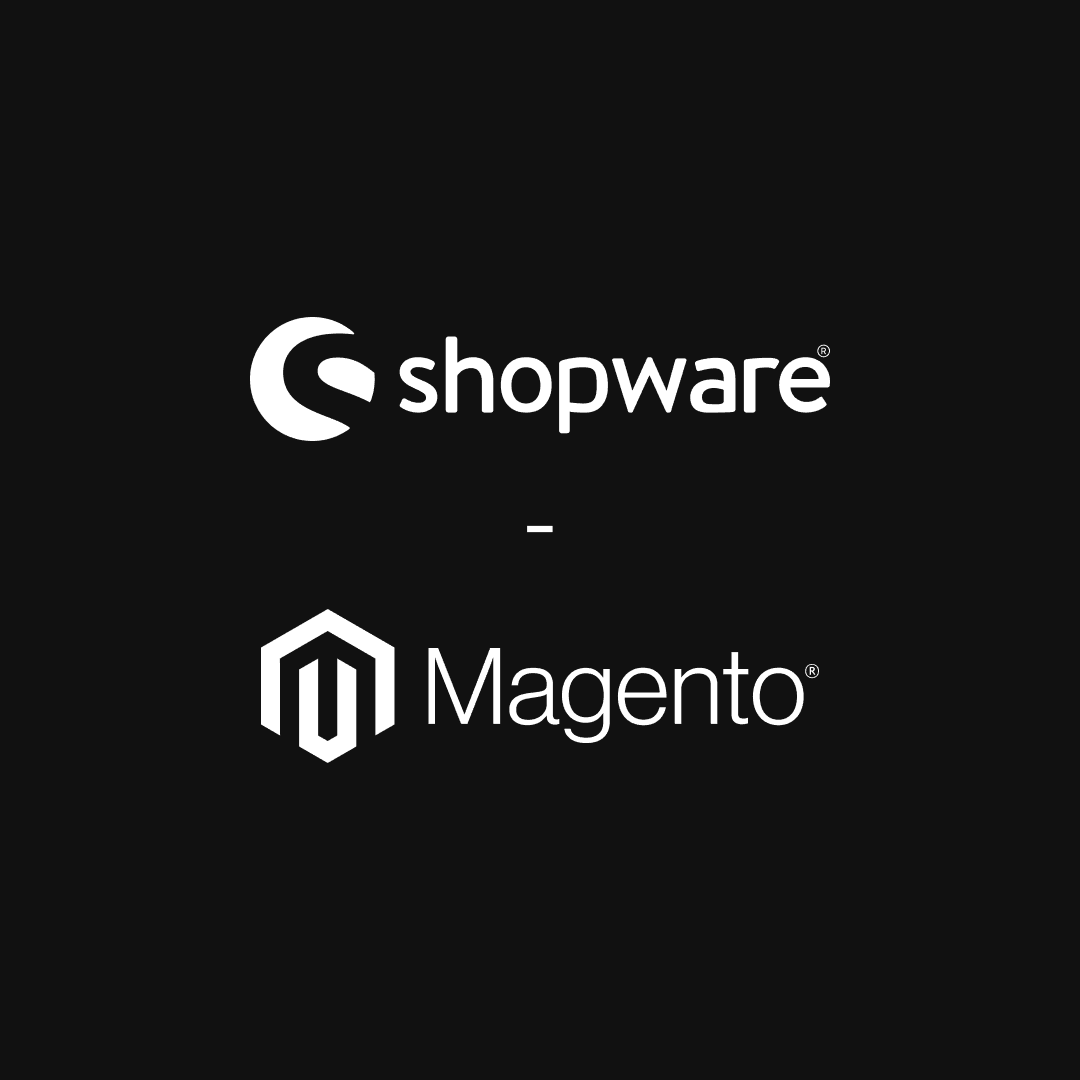Shopware vs. Magento: Shopware offers user-friendly storytelling features, while Magento excels in scalability and extensive customization options.
June 21, 2024
– 7 minute read
Shopware vs Magento: Deciding between e-commerce platforms
The ecommerce landscape has evolved exponentially over the past decade, giving birth to a myriad of platforms tailored to meet the varying needs of online businesses. In the vast sea of ecommerce solutions, two platforms have emerged as significant players: Shopware and Magento. Each brings its unique set of capabilities to the table, catering to businesses from budding startups to established giants.
Whether you're a startup looking to carve a niche in the digital marketplace or a large enterprise aiming to amplify your online presence, choosing the right platform is paramount. Not only due to the size of your company, but due to the processes within your company, your products, and simply how you like to work.
This article delves deep into a side-by-side comparison of Shopware vs Magento, exploring their strengths, features, and suitability for different business models. By the end, you'll be armed with the insights needed to make an informed decision for your ecommerce journey.
Background & Target Market
Shopware
Emerging from Germany in 2000, Shopware has grown exponentially, positioning itself as a robust eCommerce solution tailored primarily for medium-sized to large enterprise businesses. The platform takes pride in offering 'shopping worlds,' a unique feature enhancing the shopping experiences of users, making it a top choice for businesses in the B2C market. Moreover, Shopware's emphasis on storytelling and emotional shopping makes it a standout in the industry.
Magento
Acquired by Adobe in 2018, Magento has been a formidable name in the eCommerce arena since its inception in 2007. With a wide range of features suited for businesses of all sizes, Magento's flexible business models are particularly attractive to larger enterprises. With its expansive community of active members, Magento is a force to reckon with in the ever-competitive online store market.
User Experience & Interface
Shopware
When it comes to user friendliness, Shopware delivers. Its intuitive admin panel, coupled with drag and drop functionalities, allows even the least tech-savvy users to craft enticing shopping worlds. Moreover, the platform’s backend offers clear navigation, ensuring tasks like product uploads or marketing campaign designs are straightforward.
Magento
Magento, known for its versatility, does come with a steeper learning curve. Its admin panel, brimming with advanced features, can seem overwhelming for novices. However, once familiarized, the breadth of its capabilities becomes apparent. It provides businesses with extensive customization options, but the trade-off is the time investment required to master its interface.
Features
Shopware
Shopware sets itself apart with its innovative 'Shopping Worlds' feature, allowing businesses to craft immersive and unique shopping experiences. The feature ensures that brands can showcase their identity and tailor their online store to specific target groups, making shopping more intuitive and engaging.
Shopware also offers a streamlined and integrated content management system that makes it simpler to manage and present products. Additionally, the platform's focus on storytelling helps brands to create compelling narratives around their products, which has become a major draw for many businesses. Its API-first approach ensures that businesses can smoothly integrate various third-party tools and solutions to further expand their online store's capabilities.
Magento
Magento is a powerhouse when it comes to features. Its robustness is evident from its extensive customization options, allowing brands to tailor every aspect of their online store. The platform offers a wide range of marketing tools, including SEO, email marketing integration, and customer segmentation, ensuring brands can effectively target their audience.
One of Magento's standout features is its multi-store capability, which allows businesses to manage multiple stores from a single admin panel. Moreover, its advanced search features, layered navigation, and extensive product management options make it a go-to choice for businesses looking for in-depth functionality.
Hardware Compatibility
Shopware
Being a web-based eCommerce platform, Shopware doesn't have hardware requirements per se. However, its performance is optimized when used with recommended server settings. The platform seamlessly integrates with most hosting solutions and offers guidelines to ensure smooth operation.
Magento
Magento, being a more resource-intensive platform, has specific hardware requirements, especially for its enterprise editions. High-performance servers are a must to handle Magento's extensive feature set. The platform also provides recommendations for database servers, PHP settings, and other technical aspects to guarantee optimum performance.
Pricing
Shopware
Shopware offers a unique pricing model. While it provides a free Community Edition, businesses often gravitate towards its paid versions for more features. The Professional Edition, with its one-time fee, includes all core features and additional premium plugins. For larger enterprises requiring a tailored solution, the Enterprise Edition, with its custom pricing, becomes the go-to.
Magento
Magento's pricing strategy caters to a diverse clientele. It offers a free Open Source edition, suited for small to medium businesses. However, the Magento Commerce edition, designed for larger enterprises, comes with a licensing fee. This fee varies based on the company’s gross sales revenue, ensuring scalability as businesses grow.
Customer Support
Shopware
Shopware takes pride in its comprehensive customer support. The Community Edition users can seek assistance from the platform's extensive online community. In contrast, the paid versions come with additional support channels, including direct lines to Shopware's support team, ensuring timely resolution of any issues.
Magento
Given Magento's vast community of active members, help is never far away. The free version primarily relies on community forums and documentation. However, the Commerce edition users benefit from dedicated technical support, ensuring smooth operation. Additionally, Magento's extensive network of partners and developers means that third-party support is readily available.
Loyalty Program Capabilities
Shopware
Loyalty programs play a pivotal role in retaining customers, and Shopware understands this significance. Their platform integrates seamlessly with various loyalty program plugins, enabling businesses to craft compelling reward systems. From points-based systems to tiered memberships, Shopware's extensible nature facilitates easy incorporation of these tools, allowing businesses to incentivize and engage their loyal customer base effectively.
Magento
Magento offers a leg up when it comes to loyalty program capabilities, especially with its Commerce edition. The platform provides native tools that empower businesses to create personalized reward programs. Features such as reward points, store credits, and private sales events are effortlessly manageable through the admin panel. With its wide range of third-party extensions, Magento ensures businesses can concoct the perfect loyalty scheme to keep their customers coming back.
Integration Capabilities
Shopware
Integration is where Shopware truly shines. Its API-driven approach ensures businesses can seamlessly connect with CRM, ERP, or any other systems. The platform's 'Plugin Manager' is a hub for numerous third-party integrations, catering to diverse business needs, from payment gateways to shipping logistics. Shopware's commitment to flexibility ensures its compatibility with a myriad of tools, streamlining operations for businesses.
Magento
Boasting a robust API and a vast ecosystem of extensions, Magento is built for integration. Whether it's syncing with major CRM systems, integrating with global payment gateways, or connecting to inventory management tools, Magento’s extensibility is unparalleled. The platform’s marketplace is a treasure trove of integrations, making it a one-stop-shop for businesses looking to augment their eCommerce operations.
Company Footprint
Shopware
In the European market, particularly in Germany, Shopware has made a significant impact. The platform has found its niche primarily among medium-sized businesses that value its adaptability and user-friendly features. Over the years, its community of active members has grown, fostering a culture of collaboration and shared learning. With both free and paid versions available, Shopware has positioned itself as an accessible choice for many, from startups to well-established enterprises.
Magento
Magento, an Adobe company, boasts a global footprint. It's a name synonymous with large enterprise ecommerce, and its reputation precedes it in North America, Europe, and parts of Asia. Its two main editions, Open Source and Commerce, cater to a wide range of business models, from small startups to massive conglomerates. Magento's community is vast and active, with developers and business owners alike contributing to its growth and evolution.
Comparative Overview
User-Friendliness: Shopware is often lauded for its drag-and-drop features, making it immensely user-friendly, especially for those less technically inclined. Magento, while powerful, has a steeper learning curve. Its admin panel is robust but might seem complex for newcomers.
Features: Both platforms offer a plethora of advanced features, though Magento's enterprise editions tend to have a broader scope, catering to larger businesses with more intricate needs. Shopware's 'Shopping Worlds' is a notable standout, allowing businesses to craft unique shopping experiences.
Pricing: Shopware offers a free version, which is a boon for businesses on a tight budget. However, its professional edition comes at a cost. Magento's Open Source edition is free, but the Commerce edition, with its advanced features, can be expensive.
Integration: Both platforms excel in this domain, but Magento's extensive marketplace of extensions slightly edges out Shopware's Plugin Manager in terms of sheer volume and diversity.
Support and Community: Magento’s vast global community is one of its strongest assets. Shopware, though smaller in comparison, has a tight-knit and highly active community, especially in its stronghold regions.
Conclusion
Choosing between Shopware and Magento is a monumental decision for any online business owner, as the platform you choose can profoundly influence your operational efficiency, growth potential, and overall customer experience.
Shopware, with its emphasis on storytelling and customer-centric shopping experiences, is ideal for businesses that prioritize brand presentation and engagement. Its user-friendly interface ensures that even those with limited technical know-how can create a captivating online presence. This platform is a testament to the evolution of ecommerce, where the shopping experience is as vital as the products being sold.
Magento, on the other hand, is the embodiment of scalability and flexibility. For businesses with grand visions and global ambitions, Magento offers a foundation robust enough to support extensive growth. Its vast array of features ensures that businesses can evolve and adapt as market demands shift and grow.
It's also vital to consider the community and support when making a choice. Magento's expansive global community means a plethora of plugins, extensions, and solutions are continually being developed. Shopware's community, though regional, is passionate and dedicated, ensuring that help is always at hand.
Lastly, while features and capabilities play a crucial role, it's the alignment with business goals, anticipated future challenges, and the scalability needs that should be the guiding lights in the decision-making process. Evaluating both platforms against your long-term business strategy will ensure that your ecommerce venture stands on a solid foundation, ready to face the ever-evolving digital landscape.



